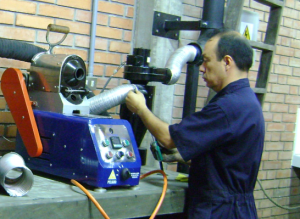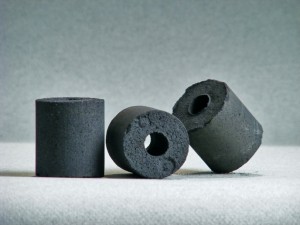In Peru, farming, agribusiness and the wood industry are an important sources of dry waste biomass which annually generate more than 11’600,000 metric tons/year . Biomass residues possess on average 13,000 kJ / kg.
The waste biomass material accumulate near the centers of generation with the problems of pests and soil mineralization so they are burned or thrown into rivers to eliminate generating pollution. The densification represents an interesting alternative for energy use and easy replicability because it not require a sophisticated technology. Densified products developed called «briquettes» can be used as fuel for cooking processes, water heating and house heating.
However, the main disadvantage of the briquettes developed is the smoke generation during their combustion ; biodegradation and low combustion efficiency for the moisture present. The calorific value appears to be similar to or lower than the raw material. In order to provide a densified product with improved characteristics has been incorporated in the conditioning step of the raw material a thermochemical roasting process which is a slow heating of the residual biomass, in an atmosphere with a limited presence of oxygen at a temperature near 270 ° C for 30 minutes.
This process is carried out in a cylindrical reactor. In this research work 3 residues were chosenone from the agricultural sector – coffee husk, one from the wood industry –wood chip – and other from the food and beverage sector – barley husk. The roasting process gave the barley husks, coffee husks and wood chips the possibility to improve their properties with an increase in calorific value 13.6 %, 16 % and 18.7 %.
The volatile content was reduced by 38.7 %, 27.4 % and 28.7% respectively. In addition, the raw material toast used to make briquettes showed a greater homogeneity and a greater friability which facilitated the process of size reduction (grinding). The biomasses toasts were used in the preparation of briquettes with cornstarch gel as a binder. Under this procedure, the briquettes showed an average density of 700 kg/m3 , increased resistance to biodegradation , and improved performance in combustion processes.
Autor(es):Assureira Espinoza, Estela, Assureira Espinoza, Marco Antonio
Año: 2013
Título de la revista: International Journal of Applied Science and Technology
Volumen: 3
Número: 7
Página inicial - Página final: 127-129
Url: http://www.ijastnet.com/journals/Vol_3_No_7_October_2013/13.pdf


